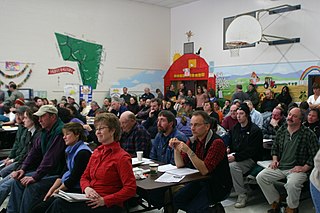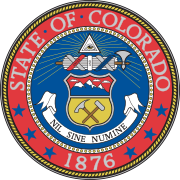Differences with Amendment 39
Also on the 2006 ballot is Amendment 39, a proposed amendment to the state Constitution, which also proposes changes to school district budgetary requirements. Notably different is the fact that Amendment 39 does not require that any of the earmarked 65% of funding go to principals, support staff, or support services provided at the school level.
The two ballot items also define a district's operating budget differently, which can affect various districts differently. Using the 2004-2005 school year as an example, the budget expenditures on items specified in Referendum J received 83% of district operating budgets on average, already well over the 65% that would be required by the new law, while according to Amendment 39's budget definitions only 60% of the budget was already spent in that year on the budget items specified by Amendment 39.
Aside from the average, however, individual school budget analyses show that at least some schools in the state failed to meet the 65% requirements set forth by each of the ballot proposals. 166 school districts would have fallen short by a total of $278 million according to the requirements of Amendment 39, while three districts would have fallen short for a total of approximately one million dollars under the requirements of Referendum J, if they had both been in effect for the 2004-2005 school year.

A town meeting is a form of direct democracy in which most or all of the members of a community come together to legislate policy and budgets for local government. It is a town- or city-level meeting in which decisions are made, in contrast with town hall meetings held by state and national politicians to answer questions from their constituents, which have no decision-making power.

The Colorado General Assembly is the state legislature of the State of Colorado. It is a bicameral legislature that was created by the 1876 state constitution. Its statutes are codified in the Colorado Revised Statutes (C.R.S.). The session laws are published in the Session Laws of Colorado.

Proposition 58 was a California ballot proposition on the March 2, 2004 ballot. It passed with 4,535,084 (71.2%) votes in favor and 1,841,138 (28.8%) against. It was officially called the California Balanced Budget Act. It requires the state legislature to pass a balanced budget every year, which means that budgeted recurrent expenditure, including repayment of past debt, does not exceed estimated revenue. The act does not require that capital works programs be funded out of current revenues. The California Constitution has always allowed bond issues for specified capital works, above a certain value. Bond measures must be approved by a statewide ballot.
A town council, village council or rural council is a form of local government for small municipalities.
In the politics of the United States, the process of initiatives and referendums allow citizens of many U.S. states to place new legislation on a popular ballot, or to place legislation that has recently been passed by a legislature on a ballot for a popular vote. Initiatives and referendums, along with recall elections and popular primary elections, are signature reforms of the Progressive Era; they are written into several state constitutions, particularly in the West.
The Taxpayer Bill of Rights is a concept advocated by conservative and free market libertarian groups, primarily in the United States, as a way of limiting the growth of government. It is not a charter of rights but a provision requiring that increases in overall tax revenue be tied to inflation and population increases unless larger increases are approved by referendum.

The California special election of 2005 was held on November 8, 2005 after being called by Governor Arnold Schwarzenegger on June 13, 2005.

Proposition 76 was a ballot proposition in the state of California in the referendum election. It involves school funding, state spending, and is an initiative constitutional amendment.

Fund accounting is an accounting system for recording resources whose use has been limited by the donor, grant authority, governing agency, or other individuals or organisations or by law. It emphasizes accountability rather than profitability, and is used by Nonprofit organizations and by governments. In this method, a fund consists of a self-balancing set of accounts and each are reported as either unrestricted, temporarily restricted or permanently restricted based on the provider-imposed restrictions.

California Proposition 92 was Californian ballot proposition that voters rejected on February 5, 2008. It was a state initiative that would have amended Proposition 98, which set a mandate for the minimum level of funding each year for elementary and secondary schools and for the California Community Colleges.
An earmark is a provision inserted into a discretionary spending appropriations bill that directs funds to a specific recipient while circumventing the merit-based or competitive funds allocation process. Earmarks feature in American and South African public finance.

California's state elections were held November 3, 1992. Necessary primary elections were held on March 3. Up for election were all the seats of the State Assembly, 20 seats of the State Senate, and fifteen ballot measures.

Initiative 126 or the Savings Account for Education Initiative will appear on the ballot as Amendment 59. The measure would create a savings account within the State Education Fund, to be funded from 10% of the monies deposited into the State Education Fund, including revenue that would otherwise be rebated under the TABOR rules, which the measure calls for diverting to the State Education Fund.
Buckley v. American Constitutional Law Foundation, Inc., 525 U.S. 182 (1999), was a United States Supreme Court case that dealt with the authority of states to regulate the electoral process, and the point at which state regulations of the electoral process violate the First Amendment freedoms.

A referendum to amend the Constitution of Liberia was held on 23 August 2011. Voters chose whether to ratify four amendments regarding judge tenure, elections scheduling, presidential candidate requirements and the electoral system. The National Elections Commission of Liberia (NEC) oversaw the referendum.

The California state elections was held on Election Day, November 6, 2012. On the ballot were eleven propositions, various parties' nominees for the United States presidency, the Class I Senator to the United States Senate, all of California's seats to the House of Representatives, all of the seats of the State Assembly, and all odd-numbered seats of the State Senate.

Municipal elections were held in San Diego in 2016 for mayor, city attorney, city council, and ballot measures. The primary election was held on Tuesday, June 7, 2016, and the general election was held on Tuesday, November 8, 2016. Five of the nine council seats were contested. Two city council incumbents ran for reelection.

Proposition 218 is an adopted initiative constitutional amendment in the state of California that appeared on the November 5, 1996, statewide election ballot. Proposition 218 revolutionized local and regional government finance in California. Called the “Right to Vote on Taxes Act,” Proposition 218 was sponsored by the Howard Jarvis Taxpayers Association as a constitutional follow-up to the landmark Proposition 13 property tax revolt initiative constitutional amendment approved by California voters on June 6, 1978. Proposition 218 was drafted by constitutional attorneys Jonathan Coupal and Jack Cohen.






